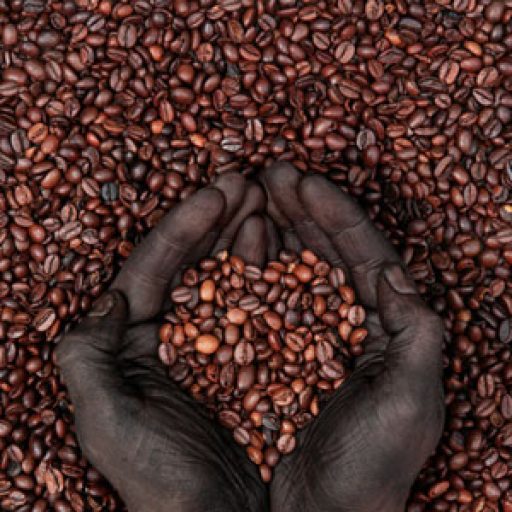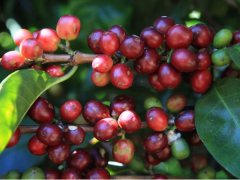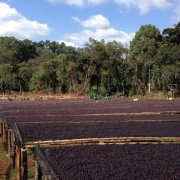The delicious origin and brief history of Kenyan coffee what are the benefits of drinking Kenyan coffee

Professional coffee knowledge exchange more coffee bean information please follow the coffee workshop (Wechat official account cafe_style)
Kenyan coffee pinyin: ken ya ka fei
Catalogue
1 basic introduction
2 Coffee flavor
3 the origin of delicious food
4 brief history
5 delicacy appreciation
6 benefits
Kenyan coffee
Kenyan coffee tastes so unique that there is almost no similar coffee. Kenyan coffee is characterized by a distinctive fruity aroma. Try to find this flavor in the coffee and pay attention to how it feels in the mouth. One of the common fruit aromas is citrus. Kenyan coffee has a multi-layered taste and the acidity of fruit juice, perfect grapefruit and wine flavor, medium mellow. Kenya is located on the equator on the Indian Ocean coast of east-central Africa, to the south of Ethiopia.
Basic introduction
Kenya is bordered to the north by Ethiopia, the origin of Arabica coffee trees, but it was not until the beginning of the 20th century that coffee cultivation began. In the 19th century, missionaries introduced Arabica trees from Yemen, but did not plant them in large quantities. It was not until 1893 that coffee was cultivated on a large scale after the introduction of Brazil's ancient bourbon seeds. That is to say, Kenyan coffee is of Brazilian origin. Due to the differences in water, climate and handling, the taste of Kenyan beans is very different from that of Brazilian beans.
Brazilian coffee is planted at a low altitude, with soft texture and no obvious sour taste. In contrast, Kenyan coffee trees are mainly concentrated on the slopes near Mount Kenya, about 4 to 6500 feet above sea level, which is suitable for coffee beans to develop their flavor, because the mountain temperature is lower and the growth is slower, and the aromatic components of coffee beans are fully developed. the acidity of the fruit is more obvious and the texture is harder. In addition, Kenya was an early British colony, and the British had established a set of perfect cultivation and quality control system. After Kenya became independent, the coffee industry was built on its existing foundation.
There are two types of coffee farms in Kenya. One is a large plantation that covers an area of more than five acres, but the average elevation is low. In the case of Kenyan coffee, the coffee beans of the large farms are of medium quality. The best Kenyan beans come from small farms, most of which are located in the foothills or volcanic slopes above 5,000 to 6,000 feet. Each small farmer has a capacity of only 20 to 70 bags per season and cannot afford to invest in expensive washing plants, but small farmers are very United. Hundreds or thousands of households are gathered to set up a cooperative farm, which is funded by the government to build a washing treatment plant, and the coffee fruits picked by small farmers are sent to the cooperative farm for unified processing. First remove the half-ripe or rotten fruit, then peel, ferment, decompose the flesh, remove the coffee beans, then dry and polish, the whole process is supervised by the official Coffee Administration, which ensures the quality of Kenyan coffee. Kenya bean washing processing technology and high standards of quality control, has always been an example of bean-producing countries.
Don't underestimate the small farmers in Kenya, they are just like ants, and their overall production capacity is higher than that of large farms, about six to four, which is quite rare in bean-producing countries. Kenyan coffee is widely appreciated by connoisseurs, thanks in large part to small farmers guarding the foothills and producing high-quality coffee. In addition, Kenya beans must have a strict grading system. Coffee beans taken out by washing plants are divided into seven grades according to size, shape and hardness, the highest is AA or AA+, followed by AB, PB, C, E, TT, T. This grading system is similar to Colombia, mainly in terms of particle size and shape, but selling well does not necessarily lead to good flavor. This is what coffee fans should know.
In recent years, the international evaluation of Kenyan beans is not as good as in previous years. It is believed that this is related to the abnormal climate in recent years, which is not conducive to the growth of coffee, but the matter is not so simple. This is related to the Kenyan authorities' efforts to promote the new variety Ruiru11 with stronger disease resistance and higher yield per unit. According to the taste test, the new variety with higher economic value has a worse flavor than the traditional variety, and to make matters worse, Ruiru11 is about to replace the traditional Arabica and Bourbon varieties. In addition, the quality of coffee is declining, the auction price is not good, and the income of small farmers is reduced. Coupled with the fact that the coffee management bureau is not a paradox, farmers' enthusiasm for coffee will be greatly reduced, which will of course affect the quality of coffee. Moreover, Kenya's outstanding washing technology has also declined, which is the killer of strangling quality.
Coffee flavor
High-quality Kenyan coffee is aromatic, full-bodied and fruity, with a rich and perfect taste. Kenyan coffee has a wonderful fruit flavor, tastes like BlackBerry and grapefruit, and is a favorite of many coffee gluttons. This coffee has an excellent medium purity, crisp and refreshing taste. It has a fresh flavor and is most suitable for drinking iced coffee in summer. When tasting this coffee, if it is paired with sour fruits such as grapefruit, it will certainly give me the best coffee experience. "not much like coffee, but a bit like fruit tea" is the common feeling of many people about this kind of shallow roasted Kenyan coffee.
In addition to having obvious and charming fruit acidity, Kenyan coffee is mostly from small coffee farmers, planted in a variety of different environments, encounter different climate and rainfall every year, and bring a variety of distinct and unique personalities. Take the AAPlus grade "KenyaAA+Samburu" as an example, the Samburu in 2001 has a strong aroma of black plum, the acidity is not high, and the taste is strong. The newly harvested Samburu in the winter of 2002 presents a completely different flavor, mulberry and green plum, with a little Nanyang spice (Spicy) flavor, after drinking, the aftertaste has the sweetness of green tea, the acidity is slightly higher than the year before, the taste is still strong. The common Kenyan taste is not strong, but it has a bright fruit-like flavor, some spicy and some red wine. This is how Kenyan coffee makes coffee fans full of expectations and surprises!
Delicious origin
High-quality Kenyan coffee beans entered Kenya in the 19th century, when Ethiopian coffee drinks were imported to Kenya through South Yemen. But it was not until the beginning of the 20th century that the bourbon coffee tree was saint. The Austin Mission (St.AustinMission) was introduced.
Kenyan coffee with fragrant, full-bodied, fruity flavor and rich taste
Kenyan coffee is mostly grown at an altitude of 1500m, 2100m, and is harvested twice a year. To ensure that only ripe berries are picked, people must tour the forest about seven times. Kenyan coffee is grown by small farmers. After they harvest the coffee, they first send the fresh coffee beans to the cooperative cleaning station. The washing station sends the dried coffee to the cooperative in the form of "parchment coffee beans" (that is, coffee beans covered with endocarp) to the cooperative ("parchment coffee beans" is the last state of coffee beans before peeling). All the coffee is collected together, and the growers charge the average price according to their actual quality. This trading method generally works well and is fair to both growers and consumers.
Brief history
Kenya AA coffee beans are adjacent to Ethiopia, the origin of Arabica coffee trees in the north of Kenya, but it was not until the beginning of the 20th century that they began to engage in coffee cultivation. In the 19th century, missionaries introduced Arabica trees from Yemen, but did not plant them in large quantities. It was not until 1893 that coffee was cultivated on a large scale after the introduction of Brazil's ancient "bourbon" coffee seeds. In other words, the current Kenyan coffee is of Brazilian origin, and the taste of Kenyan beans is very different from that of Brazilian beans due to differences in water, climate and handling.
Brazilian coffee is planted at a low altitude, with soft texture and no obvious sour taste. In contrast, Kenyan coffee trees are mainly concentrated on the slopes near Mount Kenya, about 4 to 6500 feet above sea level, which is suitable for coffee beans to develop their flavor, because the mountain temperature is lower and the growth is slower, and the aromatic components of coffee beans are fully developed. the acidity of the fruit is more obvious and the texture is harder.
In addition, Kenya was an early British colony, and the British had established a perfect cultivation and quality control system. After the independence of Kenya, the coffee industry has made great strides on the existing basis and has become a foreign exchange earning industry in Kenya.
Delicious appreciation
Kenyan AA coffee light knows the excellent brewing skills, but does not know how to taste the coffee, then the original delicious may become tasteless. Some people taste coffee with the taste of the tongue, while others enjoy the aromatic mellow in the mouth. in addition, it depends on the condition of the body and the atmosphere around the coffee. In a word, tasting coffee is a very delicate thing.
When you drink coffee in a coffee shop, you sometimes drink almost half-cold coffee. No matter how good the coffee beans are and how good the brewing skills are, you will lose your appetite for coffee. Drinking while it is hot is a necessary condition for tasting delicious coffee, even on a hot summer day. When the coffee is cold, the flavor will decrease, so when brewing the coffee, in order not to reduce the taste of the coffee, soak the coffee cup in boiling water in advance. The appropriate temperature for coffee is 83 degrees Celsius at the moment of brewing, 80 degrees Celsius when pouring into the cup, and 61-62 degrees into the mouth, which is the most ideal.
Taste delicious coffee, in addition to pay attention to the appropriate temperature, but also have the right amount. Drinking coffee is not like drinking or juice, a full cup of coffee, watching it will lose interest in drinking. Generally speaking, it is only seven or eight minutes full for the right amount, moderate amount of coffee will not only stimulate the taste, after drinking it will not have a "greasy" feeling, but endless aftertaste. At the same time, the right amount of coffee can moderately promote the body to recover from fatigue and refresh the mind.
There are different flavors of coffee, so you can't drink three or four cups in a row like tea or cola, but the size of a formal coffee cup is just right. Ordinary coffee to 80-100cc for the right amount, sometimes if you want to drink three or four cups in a row, then it is necessary to dilute the concentration of coffee, or add a lot of milk, but still take into account the degree of physical needs, to add or reduce the concentration of coffee, that is, do not cause greasy or nauseous feeling, and in the allocation of sugar might as well be more changes to make the coffee more delicious.
Benefit
1. Coffee contains certain nutrients. Nicotinic acid in coffee contains vitamin B, which is higher in roasted coffee beans. And there are free fatty acids, caffeine, tannic acid and so on.
two。 Coffee is good for the skin. Coffee can promote metabolic function, activate digestive organs, and has a great effect on constipation. Taking a bath with coffee powder is a kind of thermotherapy, which has the effect of losing weight.
3. Coffee has the function of relieving alcohol. Drinking coffee after drinking alcohol will quickly oxidize the acetaldehyde converted from alcohol, decompose it into water and carbon dioxide and discharge it out of the body.
4. Coffee can relieve fatigue. In order to eliminate fatigue, we must supplement nutrition, rest and sleep, and promote metabolic functions, and coffee has these functions.
5. Three cups of coffee a day can prevent gallstones. For caffeinated coffee, which stimulates gallbladder contraction and reduces cholesterol, which is prone to gallstones, Harvard University researchers found that men who drank two to three cups of coffee a day were less than 40 per cent more likely to develop gallstones.
6. Drinking coffee regularly can prevent radiation damage. Radiation damage, especially the radiation of electrical appliances, has become a prominent pollution at present. Indian Barba atomic researchers have come to this conclusion in mouse experiments and say it can be applied to humans.
7. The health care and medical function of coffee. Coffee has the functions of anti-oxidation and heart protection, strengthening jin bone, benefiting waist and knees, appetizer, eliminating fat and accumulation, promoting orifice and dehumidification, promoting blood circulation and removing blood stasis, relieving wind and relieving spasm and so on.
8. The influence of coffee on mood. Experiments show that the average person absorbs 300 milligrams of caffeine (about 3 cups of brewed coffee) a day, which has a good effect on a person's alertness and mood.
Important Notice :
前街咖啡 FrontStreet Coffee has moved to new addredd:
FrontStreet Coffee Address: 315,Donghua East Road,GuangZhou
Tel:020 38364473
- Prev

Kenya PB flavor characteristics of Kenyan round bean coffee what other grades of Kenyan coffee beans are there?
Professional coffee knowledge exchange more coffee bean information please follow the coffee workshop (Wechat official account cafe_style) Kenya round bean coffee Kenya PB producing area / estate around the mountains of Kenya (Mt.kenya, volcano) and Mount Mt.Elgon (Mt.Elgon) production geographical environment above sea level 1400 1700 meters above sea level washing treatment taste special introduction to Kenya
- Next

Level Up candlelight Drima Zede N sun Sidama candlelight is Yega Sheffield or Sidamo
Professional coffee knowledge exchange more coffee bean information please follow the coffee workshop (Wechat official account cafe_style) 90 + what is the difference between honey kiss and candle taste introduction candle (Drima Zede) is a sub-brand Level Up product of Ninety Plus, produced in Cochel, Yegashefi, Ethiopia, treated in the sun. Drima Zede is the right place
Related
- Detailed explanation of Jadeite planting Land in Panamanian Jadeite Manor introduction to the grading system of Jadeite competitive bidding, Red bid, Green bid and Rose Summer
- Story of Coffee planting in Brenka region of Costa Rica Stonehenge Manor anaerobic heavy honey treatment of flavor mouth
- What's on the barrel of Blue Mountain Coffee beans?
- Can American coffee also pull flowers? How to use hot American style to pull out a good-looking pattern?
- Can you make a cold extract with coffee beans? What is the right proportion for cold-extracted coffee formula?
- Indonesian PWN Gold Mandrine Coffee Origin Features Flavor How to Chong? Mandolin coffee is American.
- A brief introduction to the flavor characteristics of Brazilian yellow bourbon coffee beans
- What is the effect of different water quality on the flavor of cold-extracted coffee? What kind of water is best for brewing coffee?
- Why do you think of Rose Summer whenever you mention Panamanian coffee?
- Introduction to the characteristics of authentic blue mountain coffee bean producing areas? What is the CIB Coffee Authority in Jamaica?

